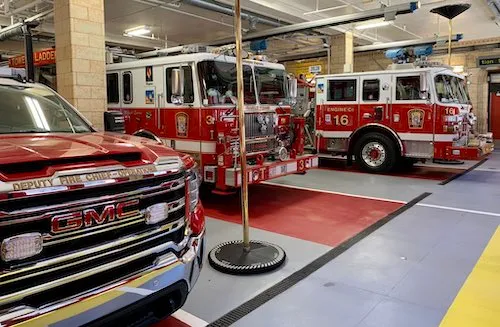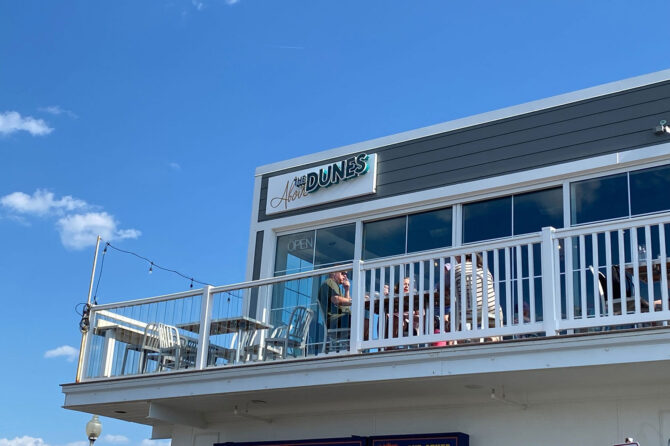Washington Informer: Nearly half a century ago, when women started joining the Washington Metropolitan Department of Fire and Emergency Services (DCFEMS), the department and accompanying union consisted mostly of white men who critics say have made significant efforts to maintain the status quo.
In the latest lawsuit filed against the fire department, four Black female firefighters allege that DCFEMS colleagues and leadership created a hostile work environment. Complaints focus on denial of additional compensation and job advancement opportunities and accumulation of disciplinary infractions that threatened career trajectory.
DCFEMS Sergeant Paramedic Jadonna Sanders, one of the four women filing the suit, said this legal action follows previous attempts to hold DCFEMS accountable.
By the time she met Attorney Pamela Keith at a town hall earlier this year, Sanders had already contacted the firefighters union, D.C. Mayor Muriel Bowser (D), Attorney General Karl Racine and the entire D.C. Council. She said only D.C. Councilmember Charles Allen (D-Ward 6) responded.
Years ago, when she laterally transferred from a paramedic to a firefighter paramedic and received a promotion to the Fire Investigation Unit, Sanders didn’t receive the 15% pay bump awarded to her colleagues.
This happened even though she maintained paramedic certifications as outlined in a union collective bargaining agreement.
Sanders said the discrimination continued well into the present day when DCFEMS ignored Sanders’ petition to place her and her daughter, who recently joined the force, in separate shifts, as has been mandated by the department to prevent substantial loss of life in one family or household.
The ongoing situation has made Sanders uncertain about her future as a firefighter.
“I wanted to go up the ladder but there was a standstill because I was afraid of the racism and discriminatory practices,” said Sanders, a 21-year FEMS member who received a promotion to sergeant last December.
“Because I was so outspoken about the practices, it deterred me from becoming an officer sooner,” Sanders added. “I always said I need to fight this fight. It hasn’t been easy going through the profession. I just want to move up to help as many people who are like me.”
The FEMS lawsuit has been filed amid litigation around a similar suit that 10 Black female police officers filed against the Metropolitan Police Department. Attorney Keith, who’s also representing the plaintiffs in that case, said the judge should be making a decision in December on a partial motion MPD filed to dismiss the suit.
Other plaintiffs named in the FEMS lawsuit include Shalonda Smith, Takeva Thomas and Bolatito “Bebe” Ajose, each of whom have decades of experience in the department. They are seeking $10 million compensation for mental and emotional distress incurred, along with the loss of compensation accumulated over several years.
According to the lawsuit, Smith, Thomas and Ajose received write-ups for what had become innocuous and common practices taught to them by senior-level officials in the department. In 2007, the DCFEMS disciplinary board suspended Sanders for 12 hours after she submitted a report denying that a Black male colleague spat on a white colleague during an altercation. Four years later, DCFEMS leadership penalized Sanders for helping co-workers resuscitate a four-year-old child experiencing cardiac arrest.
Once internal investigations open, firefighters facing disciplinary action can expect the process to last up to a year, during which they lose opportunities for promotion and overtime pay.
DCFEMS Chief Communications Officer Jennifer Donelan said the department cannot comment on pending litigation.
In 1990, DC FEMS settled a class-action lawsuit that alleged systemic racial discrimination against African Americans. Years later, another lawsuit focused on a group of female firefighters and emergency medical technicians (EMTs) who officials forced to have an abortion to keep their job. DC FEMS also settled that case and the women received more than $100,000 in damages.
Keith, an employment attorney and CEO of the Center for Employment Justice, said African-American women and other women of color continue to experience discrimination within the fire department to this day.
While she described the lawsuit as the first step in addressing a pattern, Keith encouraged advocacy groups, like the International Association of Black Professional Firefighters, to draft policies that prohibit discriminatory practices from occurring in fire departments and other institutions.
“It’s not an isolated incident or a series of incidents but a pattern . . . in which Black women are denied job development opportunities, paid less and disciplined far more harshly and retaliated against when they do complain,” Keith said.
“That’s endemic to a lot of enterprises in D.C. Some women had the courage to come forward to tell the story of how they’ve been treated. They’ve been in the fire department for decades and are strong performers in an elite division. It is ridiculous that the fire department keeps ignoring their complaints,” she said.
This article was written by the Washington Informer, read more articles like this here.
Photo: Courtesy of DC Fire and EMS via Twitter/Washington Informer










